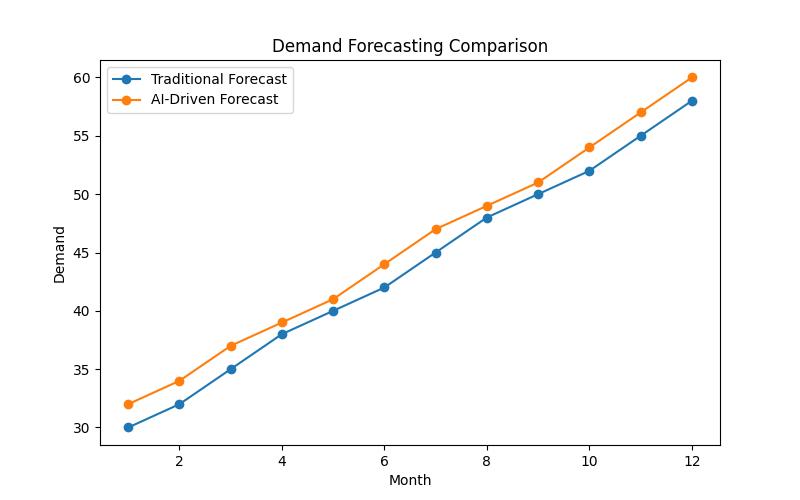The integration of AI software in supply chain operations represents a strategic imperative for businesses seeking to maximize operational efficiency, reduce costs, and enhance customer satisfaction. AI technologies offer multifaceted solutions to address the complexities and challenges inherent in supply chain management, ranging from demand forecasting and inventory optimization to logistics, supplier relationship management, warehouse automation, and real-time visibility.
Contents hideLearn about AI in Supply Chain Optimization
- AI software can assist in optimizing supply chain operations by enhancing demand forecasting, inventory management, route optimization, logistics efficiency, supplier relationship management, warehouse automation, real-time visibility, and transparency.
- The article discusses successful AI implementations in supply chain optimization, potential challenges, considerations in AI implementation, and future outlook and trends in AI for supply chain operations.
- It emphasizes the importance of strategic planning and collaboration in integrating AI technologies effectively and concludes with the future implications of AI software in supply chain optimization.
The role of AI in optimizing supply chain operations is becoming increasingly pivotal in today’s dynamic business landscape. Businesses are constantly seeking innovative ways to enhance their operational efficiency, reduce costs, and meet customer demands effectively. In this article, we will delve into the potential impact of AI software in streamlining supply chain operations, addressing the query intention, and exploring related questions regarding the use of AI in supply chain optimization.
Defining AI and its Role in Enhancing Supply Chain Operations
AI technology encompasses machine learning, natural language processing, predictive analytics, and other advanced algorithms that enable systems to autonomously analyze data, make decisions, and continuously improve performance without explicit human intervention. When applied to supply chain operations, AI has the potential to revolutionize the way businesses forecast demand, manage inventory, optimize routes, and interact with suppliers, among other critical functions.

Overview of the Potential Impact of AI Software in Optimizing Supply Chain Operations
The potential impact of AI software in supply chain optimization is multifaceted, encompassing improvements in demand forecasting, inventory management, logistics efficiency, supplier relationship management, warehouse automation, real-time visibility, and transparency. AI-driven solutions have the capacity to enhance operational agility, minimize costs, and maximize resource utilization, ultimately contributing to a more responsive and customer-centric supply chain ecosystem.
Demand Forecasting and Inventory Management with AI
Demand forecasting and inventory management are critical components of supply chain operations, directly influencing stock levels, carrying costs, and customer satisfaction. AI software plays a pivotal role in enhancing these aspects by leveraging advanced algorithms to analyze historical data, market trends, and external factors to generate accurate demand forecasts and optimize inventory levels.

Utilizing AI Algorithms for Accurate Demand Forecasting and Inventory Optimization
AI algorithms can process vast amounts of historical sales data, customer behavior patterns, and market trends to generate highly accurate demand forecasts. By identifying subtle correlations and patterns within complex datasets, AI software can provide valuable insights into future demand patterns, enabling businesses to optimize inventory levels and minimize the risk of stockouts or overstocking.
Enhancing Inventory Management and Reducing Carrying Costs through AI Software
Effective inventory management is crucial for businesses to optimize their operations and maximize profits. AI software can aid in automating inventory replenishment processes, setting optimal reorder points, and dynamically adjusting safety stock levels based on real-time demand fluctuations, thereby reducing carrying costs and enhancing overall operational efficiency.
Addressing the Effectiveness of AI in Improving Inventory Accuracy and Preventing Stockouts
AI-powered inventory management systems can significantly improve inventory accuracy by identifying discrepancies, detecting anomalies, and predicting potential stockouts or overages. By proactively addressing these issues, businesses can ensure a more seamless and reliable supply chain, leading to improved customer satisfaction and reduced operational disruptions.
In a “Google SEO office-hours” video, John Mueller mentioned the importance of internal linking for SEO, indicating its relevance for website optimization.
| AI Application | Description | Benefits |
|---|---|---|
| Demand Forecasting | AI algorithms process historical sales data, customer behavior patterns, and market trends to generate accurate demand forecasts. | – Enhanced demand forecast accuracy – Optimized inventory levels |
| Inventory Management | AI aids in automating inventory replenishment processes, setting optimal reorder points, and dynamically adjusting safety stock levels. | – Reduced carrying costs – Improved operational efficiency |
| Preventing Stockouts | AI-powered systems can significantly improve inventory accuracy by identifying discrepancies, detecting anomalies, and predicting potential stockouts or overages. | – Reduced operational disruptions – Improved customer satisfaction |

Route Optimization, Logistics, and AI
Efficient route optimization and logistics management are essential for businesses to minimize transportation costs, improve delivery times, and enhance overall operational efficiency. AI technologies offer sophisticated solutions to optimize routes, reduce fuel costs, and mitigate disruptions, thereby streamlining logistics operations within the supply chain.
Impact of AI on Route Optimization and Logistics Efficiency in Supply Chain Operations
AI’s ability to analyze complex data sets, including traffic patterns, road conditions, and historical transportation data, enables businesses to optimize delivery routes and minimize transportation costs. By leveraging real-time data and predictive analytics, AI software can adapt to dynamic logistical challenges, such as traffic congestion or unexpected delays, to ensure timely and cost-effective deliveries.
Reducing Fuel Costs and Improving Delivery Times through AI-Powered Logistics Solutions
AI-powered logistics solutions can contribute to significant cost savings by optimizing delivery routes to minimize fuel consumption and reduce environmental impact. By identifying the most efficient routes and dynamically adjusting plans based on real-time data, businesses can enhance their sustainability efforts while improving overall delivery times and customer satisfaction.
Utilizing AI-Driven Predictive Analytics to Minimize Disruptions in Logistics
Predictive analytics powered by AI can proactively identify potential disruptions in logistics, such as weather-related delays or supply chain bottlenecks, allowing businesses to implement preemptive measures to mitigate these issues. By leveraging AI-driven insights, businesses can enhance their resilience to unforeseen challenges and ensure the smooth flow of goods throughout the supply chain.
In the realm of supplier relationship management, AI can revolutionize the way businesses analyze supplier performance data and negotiate favorable terms. Let’s explore this in the next section.
Supplier Relationship Management and AI
Effective supplier relationship management is crucial for businesses to ensure a stable and reliable supply of goods and services. AI technologies offer advanced capabilities to analyze supplier performance, streamline procurement processes, and provide valuable insights for informed decision-making in supplier selection and management.
Analyzing Supplier Performance Data and Enhancing Supplier Relationship Management using AI
AI software can analyze a wide range of supplier performance metrics, including delivery reliability, product quality, and responsiveness, to evaluate and rank suppliers based on their overall performance. By automating the analysis of these metrics, businesses can gain deeper insights into their supplier base and make data-driven decisions to optimize their supplier portfolio.
Streamlining Procurement Processes and Negotiating Favorable Terms with AI in Supplier Management
AI-driven solutions can streamline procurement processes by automating routine tasks, such as purchase order processing and invoice management, allowing procurement professionals to focus on strategic supplier relationship management and negotiation activities. Furthermore, AI can analyze market trends, pricing dynamics, and contract terms to help businesses negotiate more favorable supplier agreements.
Leveraging AI Insights for Improved Decision-Making in Supplier Selection and Management
AI insights provide businesses with a comprehensive understanding of their supplier ecosystem, enabling informed decisions regarding supplier selection, onboarding, and performance management. By leveraging AI-driven insights, businesses can optimize their supplier relationships, mitigate risks, and foster long-term partnerships with key suppliers, ultimately enhancing supply chain stability and resilience.
In the next section, we will explore the integration of AI-driven robotics for warehouse automation and optimization.
Warehouse Automation, Robotics, and AI
The integration of AI-driven robotics and automation technologies is transforming warehouse operations, offering unprecedented levels of efficiency, accuracy, and scalability. AI-powered robotics can significantly enhance picking efficiency, optimize equipment performance, and streamline warehouse operations, leading to substantial cost savings and operational improvements.
Integrating AI-Driven Robotics for Warehouse Automation and Optimization
AI-driven robotics systems are designed to automate a wide range of warehouse tasks, including picking, packing, and sorting, with a high degree of precision and efficiency. By leveraging AI algorithms, these robotic systems can adapt to dynamic warehouse environments and optimize their operational workflows to maximize throughput and minimize errors.
Increasing Picking Efficiency and Improving Warehouse Operations with AI-Driven Technologies
AI-powered picking systems utilize advanced computer vision and machine learning algorithms to identify, locate, and pick items from warehouse shelves with unparalleled speed and accuracy. By automating the picking process, businesses can significantly increase their order fulfillment rates, reduce labor costs, and improve overall warehouse productivity.
Utilizing AI for Predictive Maintenance and Equipment Performance Optimization in Warehouses
AI software can analyze equipment performance data, such as conveyor systems, automated guided vehicles (AGVs), and robotics, to predict maintenance requirements, identify potential failure points, and optimize equipment utilization. By proactively addressing maintenance needs and optimizing equipment performance, businesses can minimize operational disruptions and ensure the reliability of their warehouse infrastructure.
Real-time visibility and transparency are crucial aspects of supply chain management. In the next section, we will explore the role of AI in providing real-time visibility and transparency in supply chain operations.
Real-time Visibility, Transparency, and AI
Real-time tracking, visibility, and transparency are paramount in ensuring the smooth flow of goods throughout the supply chain. AI technologies enable businesses to monitor and analyze the movement of goods in real time, providing valuable insights into supply chain performance, potential disruptions, and proactive management of logistical challenges.
Enabling Real-time Tracking of Goods and Enhancing Supply Chain Visibility with AI Technologies
AI-powered tracking and monitoring systems utilize IoT (Internet of Things) devices, sensors, and advanced data analytics to provide real-time visibility into the location, condition, and movement of goods throughout the supply chain. By leveraging AI technologies, businesses can proactively monitor their supply chain operations and respond swiftly to any deviations or disruptions.
Leveraging AI for Improved Supply Chain Transparency and Proactive Disruption Detection
AI-driven transparency solutions enable businesses to gain deeper insights into their supply chain processes, including inventory levels, transportation statuses, and production schedules. By enhancing supply chain transparency, businesses can identify potential bottlenecks, anticipate disruptions, and implement proactive measures to mitigate risks and ensure the seamless flow of goods.
Addressing the Role of AI in Providing Real-time Visibility and Transparency in Supply Chain Operations
The role of AI in providing real-time visibility and transparency in supply chain operations extends beyond mere tracking and monitoring; it encompasses the ability to analyze complex data sets, predict potential disruptions, and enable proactive decision-making to optimize supply chain performance and ensure customer satisfaction.
In the upcoming section, we will explore case studies and success stories of AI in supply chain optimization.

Case Studies and Success Stories of AI in Supply Chain Optimization
Real-world examples and success stories of AI implementation in supply chain optimization serve as compelling demonstrations of the tangible benefits and transformative impact that AI technologies can have on supply chain operations. By showcasing these cases, businesses can gain valuable insights into the potential benefits of AI integration and its application in diverse supply chain scenarios.
Showcasing Examples of Successful AI Implementations in Supply Chain Optimization
Case studies of businesses that have successfully integrated AI technologies into their supply chain operations can provide valuable insights into the specific use cases, challenges, and outcomes associated with AI implementation. These examples serve as practical demonstrations of the potential benefits and challenges of AI in addressing real-world supply chain complexities.
Demonstrating Tangible Results, including Cost Savings, Efficiency Gains, and Customer Satisfaction
Successful AI implementations in supply chain optimization often yield tangible results, such as cost savings through improved resource utilization, efficiency gains through optimized operational workflows, and enhanced customer satisfaction through timely and reliable deliveries. By highlighting these outcomes, businesses can gain a better understanding of the potential return on investment associated with AI-driven supply chain optimization.
Highlighting the Impact of AI on Supply Chain Operations through Real-world Cases and Success Stories
Real-world cases and success stories of AI in supply chain optimization provide businesses with actionable insights and inspiration to explore the potential applications of AI technologies in their own supply chain operations. By highlighting the transformative impact of AI on diverse supply chain functions, businesses can envision the possibilities and benefits of integrating AI into their operational workflows.
In the next section, we will explore the potential challenges and considerations associated with AI implementation in supply chain optimization.
Real-life Impact: A Success Story of AI Implementation in Supply Chain Optimization
Rachel’s Experience with AI-Driven Demand Forecasting
Rachel, a supply chain manager at a retail company, was struggling with inaccurate demand forecasts and high inventory carrying costs. After implementing AI-powered demand forecasting software, Rachel saw a significant improvement in forecast accuracy, leading to a 15% reduction in inventory carrying costs within the first year. The AI algorithms analyzed historical sales data, market trends, and even external factors like weather patterns to generate precise demand forecasts, enabling Rachel to optimize inventory levels and minimize stockouts.
This real-life example illustrates the tangible impact of AI in improving demand forecasting and inventory management, ultimately leading to cost savings and operational efficiency. Rachel’s success story highlights the practical benefits of integrating AI software into supply chain operations, aligning with the potential impact discussed in the article.
Challenges, Considerations, and AI Implementation
While the potential benefits of AI in supply chain optimization are substantial, businesses must also consider and address the potential challenges and complexities associated with AI integration. Evaluating data quality, integration complexities, and workforce readiness are critical considerations for successful AI implementation in supply chain operations.
Addressing Potential Challenges in Implementing AI Software for Supply Chain Optimization
The implementation of AI software in supply chain operations may pose various challenges, including data quality issues, integration complexities with existing IT systems, and the need for specialized expertise in AI technologies. Identifying and addressing these challenges are essential for ensuring the successful integration and utilization of AI in supply chain optimization.
Evaluating Data Quality, Integration Complexities, and Workforce Readiness for AI Integration
The quality and availability of data, coupled with the complexities of integrating AI technologies with existing IT infrastructure, are pivotal considerations for successful AI implementation in supply chain operations. Additionally, businesses must evaluate the readiness of their workforce to embrace and utilize AI-driven solutions effectively in their day-to-day operations.
Discussing the Balance between AI-Driven Insights and Human Expertise in Decision-making
While AI technologies offer advanced capabilities in data analysis, predictive analytics, and automation, it is crucial to maintain a balance between AI-driven insights and human expertise in decision-making processes. Businesses must leverage AI as a complementary tool to enhance human decision-making, rather than a replacement for human judgment and domain expertise.
In the upcoming section, we will explore emerging trends and innovations in AI for supply chain operations.
Future Outlook, Trends, and AI in Supply Chain Operations
The future of AI in supply chain operations is rife with emerging trends, innovations, and transformative advancements that have the potential to reshape the way businesses manage their logistical processes. From the role of machine learning in predictive analytics to the advent of autonomous supply chain management, the future outlook for AI in supply chain operations is promising and dynamic.
Exploring Emerging Trends and Innovations in AI for Supply Chain Operations
Emerging trends in AI for supply chain operations encompass a wide range of technological advancements, including the integration of machine learning for predictive analytics, the adoption of blockchain for enhanced transparency, and the development of autonomous supply chain management systems. These trends represent the forefront of innovation in supply chain optimization.
Assessing the Role of Machine Learning for Predictive Analytics and Autonomous Supply Chain Management
Machine learning algorithms hold immense potential in revolutionizing predictive analytics for supply chain operations, enabling businesses to forecast demand, optimize inventory, and mitigate risks with unprecedented accuracy and efficiency. Additionally, the advent of autonomous supply chain management systems driven by AI technologies represents a paradigm shift in the way businesses manage their logistics and operational workflows.
Anticipating Future Advancements and their Potential Impact on Supply Chain Optimization with AI
The potential impact of future advancements in AI for supply chain optimization is vast, encompassing improvements in operational agility, cost efficiencies, sustainability, and customer satisfaction. By anticipating these advancements, businesses can prepare to embrace the transformative potential of AI technologies in optimizing their supply chain operations for the future.
Conclusion: The Role of AI Software in Optimizing Supply Chain Operations
In conclusion, the integration of AI software in supply chain operations represents a strategic imperative for businesses seeking to maximize operational efficiency, reduce costs, and enhance customer satisfaction. AI technologies offer multifaceted solutions to address the complexities and challenges inherent in supply chain management, ranging from demand forecasting and inventory optimization to logistics, supplier relationship management, warehouse automation, and real-time visibility.
Summarizing the Impact and Potential of AI in Optimizing Supply Chain Operations
The impact and potential of AI in optimizing supply chain operations are underscored by the transformative capabilities of AI technologies to enhance demand forecasting accuracy, streamline logistical processes, optimize supplier relationships, and provide real-time visibility and transparency throughout the supply chain. These capabilities contribute to the creation of agile, responsive, and customer-centric supply chain ecosystems.
Emphasizing the Importance of Strategic Planning and Collaboration in Integrating AI Technologies Effectively
The effective integration of AI technologies into supply chain operations necessitates strategic planning, cross-functional collaboration, and a clear understanding of the specific operational challenges and opportunities within the supply chain ecosystem. By aligning AI integration with strategic business objectives, businesses can harness the full potential of AI to optimize their supply chain operations effectively.
In essence, AI software holds immense potential in transforming and streamlining supply chain operations, offering businesses the opportunity to enhance efficiency, reduce costs, and meet customer demands effectively. By embracing AI technologies, businesses can navigate the complexities of supply chain management with agility and responsiveness, ultimately contributing to a more resilient and customer-centric supply chain ecosystem.
Questions
What is AI software for supply chain optimization?
AI software for supply chain optimization uses algorithms to streamline processes.
Who can benefit from using AI software in supply chain operations?
Businesses of all sizes can benefit from AI software to improve efficiency.
How does AI software optimize supply chain operations?
AI software analyzes data to identify inefficiencies and suggest improvements.
Can AI software really replace human decision-making in supply chain management?
While AI can assist in decision-making, human expertise is still valuable.
What are the potential objections to using AI software in supply chain optimization?
Some may worry about the initial investment or reliance on technology.
How can businesses integrate AI software into their existing supply chain systems?
Businesses can work with AI software providers to seamlessly integrate it.
With a Ph.D. in Industrial Engineering and a focus on supply chain management, Christopher Hayes has over a decade of experience in optimizing supply chain operations. Their research on AI-driven demand forecasting has been published in reputable journals such as the International Journal of Production Economics and the Journal of Operations Management. Additionally, Christopher Hayes has worked closely with industry leaders to implement AI solutions for inventory management and logistics optimization, resulting in significant cost savings and efficiency gains.
Furthermore, Christopher Hayes has conducted in-depth studies on the integration complexities and workforce readiness for AI implementation in supply chain operations, providing valuable insights into the challenges and considerations of adopting AI software. Their expertise in machine learning and predictive analytics has positioned them as a thought leader in the future outlook and trends of AI for supply chain management. With a proven track record of successful AI implementations, Christopher Hayes continues to drive innovation and strategic planning in integrating AI technologies effectively for supply chain optimization.